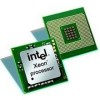Intel X5472 Specification Update - Page 32
Benign Exception after a Double Fault May Not Cause a Triple Fault
 |
UPC - 735858201551
View all Intel X5472 manuals
Add to My Manuals
Save this manual to your list of manuals |
Page 32 highlights
Implication: This erratum may lead to livelock, shutdown or other unexpected processor behavior. Intel has not observed this erratum with any commercially available software. Workaround: None identified. Status: For the steppings affected, see the Summary Tables of Changes. AX49. RSM Instruction Execution under Certain Conditions May Cause Processor Hang or Unexpected Instruction Execution Results Problem: Problem: RSM instruction execution, under certain conditions triggered by a complex sequence of internal processor micro-architectural events, may lead to processor hang, or unexpected instruction execution results. Implication: In the above sequence, the processor may live lock or hang, or RSM instruction may restart the interrupted processor context through a nondeterministic EIP offset in the code segment, resulting in unexpected instruction execution, unexpected exceptions or system hang. Intel has not observed this erratum with any commercially available software. Workaround: It is possible for the BIOS to contain a workaround for this erratum. Status: For the steppings affected, see the Summary Tables of Changes. AX50. Benign Exception after a Double Fault May Not Cause a Triple Fault Shutdown Problem: According to the Intel® 64 and IA-32 Architectures Software Developer's Manual, Volume 3A, "Exception and Interrupt Reference", if another exception occurs while attempting to call the double-fault handler, the processor enters shutdown mode. Due to this erratum, any benign faults while attempting to call double-fault handler will not cause a shutdown. However Contributory Exceptions and Page Faults will continue to cause a triple fault shutdown. Implication: If a benign exception occurs while attempting to call the double-fault handler, the processor may hang or may handle the benign exception. Intel has not observed this erratum with any commercially available software. Workaround: None identified. Status: For the steppings affected, see the Summary Tables of Changes. AX51. LER MSRs May be Incorrectly Updated Problem: The LER (Last Exception Record) MSRs, MSR_LER_FROM_LIP (1DDH) and MSR_LER_TO_LIP (1DEH) may contain incorrect values after any of the following: • Either STPCLK#, NMI (NonMaskable Interrupt) or external interrupts • CMP or TEST instructions with an uncacheable memory operand followed by a conditional jump • STI/POP SS/MOV SS instructions followed by CMP or TEST instructions and then by a conditional jump Implication: When the conditions for this erratum occur, the value of the LER MSRs may be incorrectly updated. Workaround: None identified. Status: For the steppings affected, see the Summary Tables of Changes. Intel® Xeon® Processor 5400 Series 32 Specification Update















